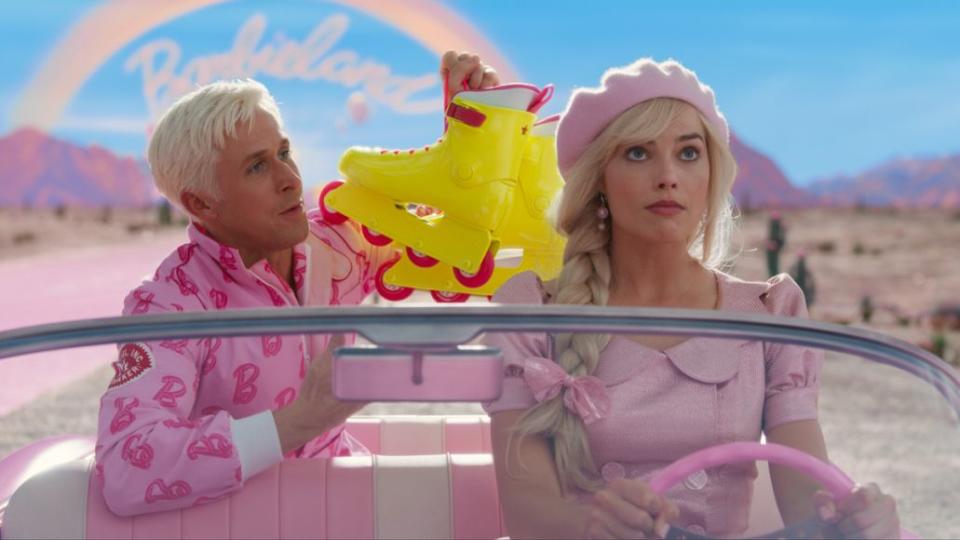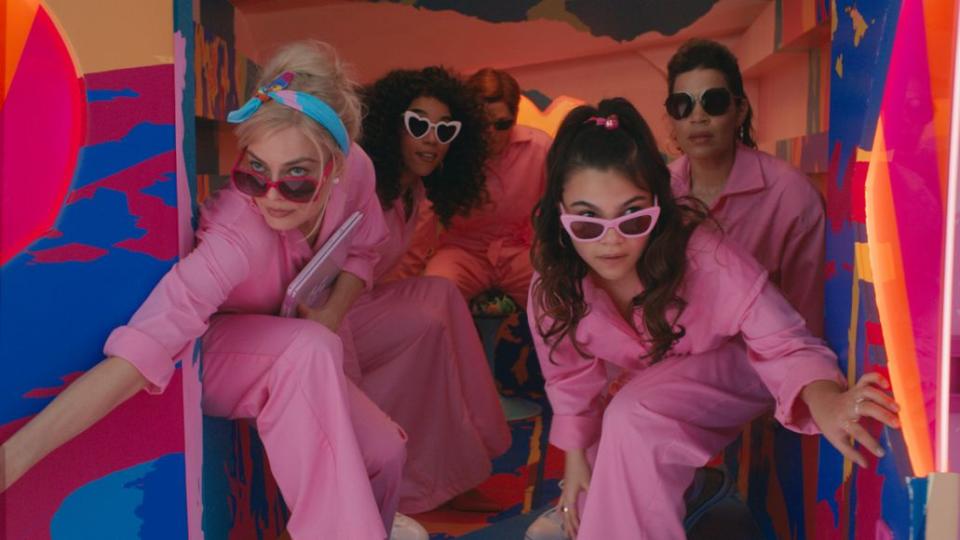Barbie Review: A Doll’s Existential Crisis Leads to One of the Year’s Most Life-Affirming Films
The post Barbie Review: A Doll’s Existential Crisis Leads to One of the Year’s Most Life-Affirming Films appeared first on Consequence.
The Pitch: Every day is a great day for Barbie (Margot Robbie). She wakes up in her Dreamhouse, takes a shower, puts on a fabulous outfit, and then heads out to spend time with her friends, who are all named Barbie, and are always happy to see her. That’s life in Barbieland for you, always the same and always perfect… Until the day comes when Barbie wakes up, and her day isn’t quite perfect. Small things go wrong, and she finds herself haunted by never-ending thoughts of death — not normal stuff for a Barbie.
Fortunately, Weird Barbie (Kate McKinnon, usually doing the splits) is able to diagnose the problem: Every Barbie in Barbieland has a corresponding girl in the Real World who plays with her, and something is clearly wrong with our Barbie’s playmate. So Barbie leaves Barbieland behind to voyage into the real world, and along for the ride is Ken (Ryan Gosling), who loves Barbie but is frustrated by the fact that every night is girls’ night, and she never makes time for him. So, while Barbie is successful in finding her playmate, Ken’s spent a little too much time in the Real World learning about the way things work here… and Barbieland may never be the same.
C’mon Barbie Let’s Go Party: Barbie is a magic trick, a stellar example of a filmmaker taking a well-established bit of corporate IP and using it to deliver a message loudly and clearly. That Greta Gerwig’s third solo film as director also manages to be a giddy, silly, and hilarious time is essential to its power, and the challenge of this review is thus trying to explore how the magic trick works, while still preserving the flat-out awe I have at what it achieves.
After all, Barbie isn’t just a toy. It’s a brand synonymous with femininity, loaded with pulsing pink power; power that’s been weaponized by anti-feminists over the years while also ruthlessly attacked by feminists themselves. If you were a girl with Barbies, you were growing up with the idea of her as “the perfect woman,” capable of every possible profession on the planet, but still largely defined by her aesthetics, from her outfits to her accessories to her braidable hair to her high heels, for which her feet have been molded permanently.
Gerwig and Noah Baumbach’s script acknowledges all the criticisms that feminists have had for years (some more superficially than others — the casting of a wide range of body types to play Barbieland Barbies does not necessarily make up for literal decades of unrealistic body expectations). Then, however, it pushes a step further into exploring the promise of Barbie, and how good intentions don’t always result in positive change.
Some of the concepts explored by Barbie will sound familiar, when it comes to the complexities that come with being a modern-day modern women, because feminists from Gloria Steinem to Liz Lemon have been articulating these themes for years now. Here’s the thing — yes, the complicated paradox of being a woman within the prison of society’s demands is well-covered ground. The reason we’re still talking about these problems is that they haven’t gone away.

Barbie (Warner Bros.)
Imagination, Life Is Your Creation: While there’s digital trickery involved in depicting the full scope of Barbieland, the fantasy world really comes to life thanks to its performances. Every Barbie and Ken on screen fully commits to touches of doll-like behavior that sell the concept of these being toys in the unseen hands of children; watching Robbie flop stiffly to the ground in a depressive funk is just one of the film’s many slapstick delights.
This is a movie that could not exist on the level it does without Margot Robbie, who’s become one of today’s most reliable stars when it comes to finding humanity in the most outlandish of figures, from Tonya Harding to Harley Quinn to now a literal piece of plastic. Barbie brings out something new in her, in the best ways.
Also, let the Best Supporting Actor campaign begin now for Gosling’s work as Ken — as Consequence has already covered, few actors have ever seemed to have this level of communion with a role, and Gosling brings out all the flavors that come with Gerwig’s approach to the character, and his importance to the story. There are moments where Gosling looks flat-out ridiculous in this movie, in ways that feel far braver than driving a motorcycle off a mountain, and are far more powerful (and hilarious) as a result.
Feel the Glamor in Pink: While the world created by cinematographer Rodrigo Prieto and production designer Sarah Greenwood is as bright, loud, and fun as the film’s pop-infused soundtrack, a subversive sense of humor lurks beneath the surface, stealthily slipping in some wild jokes, especially given this film’s parent company. (I did not expect Zach Snyder’s Justice League to get a prominent mention.)
The (very funny!) Helen Mirren serves as the film’s narrator, not just moving the action forward and delivering some key exposition, but also adding some charming meta-commentary also echoed by the film’s soundtrack — always be listening to the song lyrics, if the song in question is not Matchbox Twenty’s “Push.”
In addition, Barbie’s own legacy as a toy proves to be fair game for the comedy, as abominations like Growing Up Skipper (whose boobs get bigger) are addressed. That said, it’s kind of a surprise that there was no attempt at apologizing for one of the Barbie line’s most offensive and damaging iterations: Teen Talk Barbie, released in 1992, whose voice box alternated between statements about shopping and “math class is hard,” enforcing a gender stereotype that women-in-STEM initiatives are still working to combat.

Barbie (Warner Bros.)
Plastic Imperfections: Unlike the doll, Barbie has flaws, the largest being the presence of Will Ferrell as the CEO of Mattel (Mattel as a company plays a much bigger role in the film’s plot than anticipated). One issue is Ferrell’s association with another toy-based movie — he stars in The Lego Movie as the villainous Lord Business, and while there are a lot of ways in which the two movies are different, they’re similar enough in tone and approach for Ferrell’s presence here to make Barbie feel slightly less fresh.
In addition, the movie doesn’t quite know what to do with him; the character does serve a few key story functions, but not enough to keep him from feeling a bit extraneous. But… Okay, maybe that’s it. That’s the film’s one major flaw.
Mattel does currently have a male CEO, Ynon Kriez, though the movie does slightly exaggerate the rest of the C-suite’s makeup, as three of the 10 people listed on Mattel’s corporate leadership page are women, including Robbie Brenner, executive producer of Mattel Films. However, Gerwig chooses to depict Mattel leadership as exclusively men in dark suits, which is fair — for generations, after all, across so many toy companies, those have been the people boasting about how their products empower young girls. And that might just be part of the problem that Barbie aims to address.
The Verdict: At a certain point, Barbie fully abandons the limitations of reality, taking on a surrealist quality that makes its own rules for the universe in unexpected ways; you could spend some time trying to nitpick the world-building, but that’s so far beyond the point that it’s almost insulting to bring it up. (There’s even a dream ballet with purpose, making it one of the best dream ballets to ever be featured in a major studio movie.)
This is a film that is safe for families but has as much to say to adults as it does to kids, who needed to learn about the evils of the patriarchy anyway. Barbie takes the entire audience on a ride that goes beyond third-wave feminism to make its points about gender and culture and the pressures heaped upon not just young girls, but everyone who breathes. And it ends up becoming such a lovely tribute to being human and doing your best with that, that it makes you feel grateful for the air in your lungs, and these imperfect lives we all live.
Where to Watch: Barbie arrives in theaters on Friday, July 21st.
Trailer:
Barbie Review: A Doll’s Existential Crisis Leads to One of the Year’s Most Life-Affirming Films
Liz Shannon Miller
Popular Posts
